
Philly.com, May 22, 2011: It may well be, after all, that AWK, a Pashtun, is no more corrupt than a host of other warlords in the country, including ethnic Hazaras and Tajiks, like the governor of Balkh province, who has a notorious rep for corruption. Yet Sen. John Kerry, in Afghanistan last week, made a special visit to Atta, whose authoritarian rule does allow international aid agencies to proceed with development projects. I don’t know why Kerry was courting Atta, but Pashtuns ask: why criticize AWK for corruption if Kerry rushes to visit Atta? Why indeed? (Photos: Rahmat Gul/Associated Press)
Information in a new report suggests Afghanistan will collapse into chaos – or even more chaos – when America and her allies pull out in 2014. A huge proportion of the aid money being poured into the country now is going either to corruption or to prop up people and institutions who will not last five minutes once the foreign aid tap is turned off. (More on this below.)
The US Senate Foreign Relations Committee’s findings include:
- Since 2002 America has invested $1.4 billion in encouraging farmers to grow crops other than opium “with mixed results” (which is an understatement).
- The lack of accountability for billions of dollars of spending is frightening, leading to corruption, fraud and other abuse. An example: one narcotics and law enforcement program’s $US800 million contract services in Afghanistan are managed by one officer based in – wait for it – Washington. Many aid projects cannot be visited due to security concerns. Others are known to be half-built, or not built at all, although they've been fully paid for.
- No one has a clue how organisations set up by the Americans will survive the 2014 “transition”. There are still no plans to transfer the two counter-narcotics compounds, set up and run by the Department of State at a cost of $US60 million, to Afghan control.
The Special Inspector General for Iraq Reconstruction said in 2009 that an estimated $3 billion to $5 billion in U.S.-funded infrastructure contracting had been wasted there.
Basically, Afghanistan has become a honey pot for criminals, and not just the locals. Foreigners include US company the Louis Berger Group Inc., which rorted more than $US10 million from its payments as a major contractor, and maybe Australian Neil Campbell, now in a US jail. It’s alleged he charged a $US2000,000 cash bribe for channelling aid projects to an Afghan company.
The Afghan economy now runs on opium sales and foreign aid. Once the aid is pulled out, the wretched nation will return to its natural condition of being a narco-economy.
But will that aid stop when the Americans leave? Of course not – or not immediately. But things change. Remember what happened after the last American troops left South Vietnam in March 1973, at which stage the South had defeated the North on the field of battle. America promised to support the South financially, but the Arab-Israeli War later that year diverted US arms and money to Israel and pushed up oil prices and inflation, with devastating effects on the South Vietnamese economy. But it got worse.
According to the book Unheralded Victory by Mark W. Woodruff (HarperCollins 1999), “The return of Cold War hostilities between the Soviet Union and America saw the US Congress revoke Russia’s most favoured trading nation status, removing the 1972 trade concessions that had enticed them to reduce aid to Hanoi. The Soviet Union responded . . . by once again pouring money and equipment into North Vietnam.” In 1975, the North invaded the South again, this time successfully.
Obviously this won’t happen in Afghanistan, but other things might. While there are many problems with American aid, there will be a whole set of new ones, possibly much worse, when it is finally withdrawn. As one day it will be.
No one is preparing for that.



